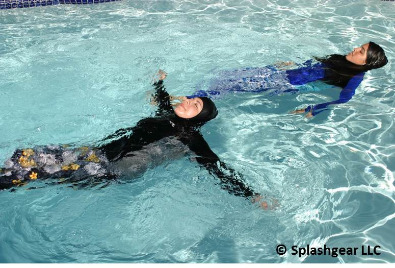Coronavirus at the pool? During the COVID-19 pandemic, authorities in some countries implemented social distancing and quarantine orders to try and slow down the spread of the SARS-CoV-2 virus. Many people stayed home from work and schools were closed or transitioned to online digital classes. While practicing social distancing, many people decided to make the best of the situation by enjoying the outdoors and some wondered if it was safe to go swimming. Questions have arisen about the spread of viruses and other microorganisms in the pool environment and people want to know if one can become infected when in a pool or hot tub. During the COVID-19 pandemic, authorities in some countries implemented social distancing and quarantine orders to try and slow down the spread of the SARS-CoV-2 virus. Many people stayed home from work and schools were closed or transitioned to online digital classes. While practicing social distancing, many people decided to make the best of the situation by enjoying the outdoors and some wondered if it was safe to go swimming. Questions have arisen about the spread of viruses and other microorganisms in the pool environment and people want to know if one can become infected when in a pool or hot tub.The good news is that coronavirus cannot survive a properly disinfected pool. The Centers for Disease Control and Prevention (CDC) has reported that, while the coronavirus has been detected in sewage systems, there is no evidence to date that coronavirus has been found in pool or hot tub water. As long as recreational water—such as pools, hot tubs, and waterparks—are properly maintained and treated, then the coronavirus is inactivated and is not transmitted. However, recreational water illnesses, or RWIs, have been reported and are caused by other types of infectious agents. There have been many scientific studies conducted that looked at the presence of infectious agents (e.g., viruses, bacteria, parasites, and fungi) in different types of bodies of water, but one should not panic because, while infections can be spread through bodies of water, most diseases are transmitted through direct contact with another person or from touching surfaces that harbor the infectious agents. Pools that are disinfected properly can kill or inactivate many disease-causing agents, but some can be tolerant of the disinfectant and can survive for days in the pool water, such as Cryptosporidium, which is a parasite; however, most viruses and bacteria are killed in a properly disinfected pool. Pools that are not properly maintained and that do not have the correct level of chlorine or bromine are not disinfected well and can harbor infectious agents. A person may be exposed to such microorganisms by swallowing the pool water or breathing in pool water spray. Hot tub temperatures may kill some disease-causing agents, but the high hot tub temperature can also interfere with the disinfectant rendering it ineffective and ultimately not being able to kill some disease-causing agents. Some people may experience “hot tub rash” because of this reason. The majority of pool infections are caused by the Cryptosporidium parasite that is spread in the pool via fecal contamination. The resulting exposure can cause diarrhea, the most common pool-related illness. Other parasites associated with water recreation include Giardia, Microsporidia, and Trematode worm. Bacteria that can cause RWIs include Legionella, Salmonella typhi, Shigella, E.coli O157, and Helicobacter pylori. When it comes to viral RWI outbreaks, 48% occur in swimming pools, 40% in lakes and ponds, 4% in fountains, 4% in natural hot springs, and 4% in rivers. The viruses that are most commonly associated with RWIs are human adenovirus, Coxsackievirus, Echovirus, Hepatitis A, and Hepatitis E. While immunocompromised individuals, or people who have weaker immune systems, are at greatest risk of severe illness, most RWIs are mild and limited and do not last long. When it comes to pool use and human health, the proper disinfectant levels should be used and pools and hot tubs should be properly maintained to prevent the spread of infectious agents and subsequent illness. Best practices for using a public water facility include showering before one enters the pool to minimize the spread of microorganisms in the water, and then showering after one exits to limit the exposure to them. Learn about more ways that you can avoid spreading and contracting infectious diseases at the pool from the CDC's "Share the fun not the germs" pool hygiene brochure in both English and Spanish. ________ Sources: - Water Recreation and Disease – Plausibility of Associated Infections: Acute Effects, Sequelae and Mortality. Kathy Pond. 2005. Published on behalf of the World Health Organization by IWA Publishing, Alliance House, 12 Caxton Street, London SW1H 0QS, UK. - Coronavirus Disease 2019 (COVID-19): Water Transmission and COVID-19. National Center for Immunization and Respiratory Diseases (NCIRD), Division of Viral Diseases. Centers for Disease Control and Prevention. - Healthy Swimming: Recreational Water Illnesses. Centers for Disease Control and Prevention. - Viruses in recreational water-borne disease outbreaks: a review. Sinclair RG, Jones EL, Gerba CP. - Journal of Applied Microbiology. 2009 Dec 1; 107(6):1769-80. |
